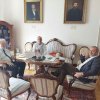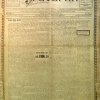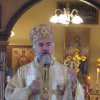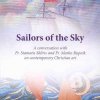The American Srbobran has been spreading its digital branches on two continents. Since 1906, the oldest continuously published Serbian newspaper in the world, the American Srbobran, has been building a strong partnership with the Library of Congress in Washington, D.C. Recently, the Library of Congress received all digital copies of the American Srbobran archive (1906 – 2022). In addition to the hard copies, the Library of Congress will also have digital copies of the American Srbobran for its website. Readers and researchers interested in Serbian-American history, the origin of their families, or any other information regarding Serbian-American history will be able to access this information on the Library of Congress website.
According to Robin Pike of the Library of Congress Serials Division and Head of the Digital Collections Services team, who handles Chronicling America, the American Srbobran will appear on their website later this year.
Angela Cannon, Librarian for the Russian and South Slavic Collections, European Division at the Library of Congress, emphasized that “the Library of Congress recognizes the value of publications by American heritage and diaspora groups and endeavors to collect these materials regardless of the language of publication. Since many publications have limited or local distribution, the acquisition of such titles is more challenging, resulting in gaps in the Library’s collection. Having contacts with members of heritage groups, such as the Serb National Federation, is especially valuable in this regard. For years the Library of Congress collected the American Srbobran and microfilmed it for posterity and interlibrary loan to researchers across the United States. Our holdings of American Srbobran begin with issues from January 1938. When we realized gaps had developed in our collection, we contacted the SNF for help. Miloš Rastović arranged for a donation of the current year of the newspaper and the purchase of many back issues from 1967 through 2014, which have now been microfilmed and are available at the Library of Congress. Having established fruitful contact with the SNF, I continued on occasion to ask the SNF for assistance in another arena research. After exhausting the resources in our collection, I have referred researchers with challenging reference questions about Serbian-American history to the SNF, which holds a deeper collection of Serbian diaspora materials, including the full run of the American Srbobran. When Mr. Rastović contacted me last year to propose a cooperative project to make the American Srbobran in its entirety freely available on the Library of Congress website, I wanted to make this happen. The American Srbobran is the primary source for research on the Serbian- American community in the United States, and its digitization will allow researchers from any part of the world to partake in its riches.“
Two of the most important cultural institutions and archives in Serbia, the National Library of Serbia in Belgrade and Matica Srpska in Novi Sad, also accepted digital copies of the American Srbobran (1906 – 2022). As a result, researchers and readers in those institutions will be able to access information about Serbian-American history. Dr. Vladimir Pistalo, Director of the National Library of Serbia and novelist, thanked the American Srbobran for the precious gift. He is familiar with the work of the longstanding and niche American Srbobran because Serbs in the United States were his dissertation subject. Thanks to the National Library of Serbia, the content of the American Srbobran digital edition until World War II will appear in the Europeana Library, funded by the European Union. The mission of the Europeana Library is to promote and preserve European cultural heritage.
As SNF Cultural Outreach Coordinator, Milos Rastovic in conversation with Dr. Dragan Stanic, President of the Matica Srpska, emphasized the readiness to expand the cooperation with Matica Srpska to the benefit of Serbian culture and heritage on both continents. Dr. Stanic expressed gratitude for this gift, which will strengthen the ties between the Serbian Diaspora and Homeland and enrich Serbian cultural heritage. Dr. Milan Micic, General Secretary of Matica Srpska, gave an insight into the importance of the documented Serbian-American history as a part of Serbian history. Since 1826, Matica Srpska is the oldest Serbian institution preserving Serbian ethnic and cultural identity and “enlightening the people.” Today, Matica Srpska has around 2,000 associates working on projects related to Serbian science, literature, art, culture, and tradition worldwide.
The history of the American Srbobran indicates the importance of preserving its archive, Serbian-Americans’ role in building the United States, and historical ties with the Homeland.After the founding of the Serbian Orthodox Federation Srbobran (1901), its members soon realized that they could only make progress if they had a newspaper informing Serbian immigrants about their work and ideas and calling on them for unity and cooperation. Therefore, to expand its influence in America and Canada, the Serbian Orthodox Federation Srbobran began publishing the American Srbobran but only in Cyrillic in 1906. From 1906 to 1916, the American Srbobran was a weekly newspaper; and from 1916, a daily newspaper. In the 1930s, an English section was added to the newspaper for the first generation of immigrants whose native language was English to become more acquainted with the Serbian culture and tradition. Today, the American Srbobran has Serbian and English sections and is a semi-monthly newspaper.
The primary role of this newspaper was described by Father Vojvodic in the first issue of the newspaper from January 18, 1906, edited by its first editor Milivoj Buzadzic:
“Our newspaper will guide our readership on the path of Serbian national awareness and dedication to the holy Orthodox Faith so that in this distant land, they do not forget the faith and the nation they have come from and for which our ancestors have shed so much blood, leaving us these two holy legacies to defend and preserve… Furthermore, we will try to make this fraternal organization [SOF Srbobran] spread as much as possible because we are fully convinced that salvation, progress, and help lie only in our community …Even now, we hear a soft voice in our hearts whispering Christ’s words: ‘Assuredly, I say to you, in as much as you did to one of the least of these My brethren, you did it to Me.’”
As in the past and today, the American Srbobran has published news about the success of Serbian-Americans, their aspirations and views on the “New Land,” the work of Serbian Orthodox Churches and church dioceses, economic and cultural educational activities, singing and athletic clubs, and societies, published books, the social life of immigrants and events in the Homeland. During World War I and II, the American Srbobran was a defender of the freedom and truth of the Serbian people. Dr. Kosta Elesin, former editor-in-chief of American Srbobran, says: “The American Srbobran serves the interests of freedom of democratic America and Serbs as a whole ... (and) will continue to fight for the unification of all Serbian countries in the spirit of the times in that form, which will be of the greatest benefit to the Serbian people, and which will suit their vital interests, and which will protect their national existence.” The SNF society Jedinstvo,” (Lodge 99), describes the attitude of Serbian-Americans in the American Srbobran: “Srbobran defends and stands on the defense of humiliated and ruined Serbs, and at the same time raises and maintains the Serbian spirit and ethics, which we need so much today.”
Many famous Serbian novelists have contributed to the American Srbobran, such as Jovan Ducic, Proka Jovkic/Nestor Zucni, Milos Crnjanski, St. Nikolai Velimirovic, Ratko Stanisic, Bozidar Puric, Dragoslav Dragutinovic, V. Rev. Dr. Stavrofor Mateja Matejic, Dragan Rajkovic, Sava Jankovic, Vasa Mihailovich, Dr. Aleksandar Petrov, Gojko Djogo, Aleksandar Slavkovic among others. In addition to authors who contributed to the American Srbobran, it has also been granted interviews with famous Serbs such as Mihajlo I. Pupin and Nikola Tesla, and Novak Djokovic, World Tennis Champion, among others. Furthermore, in 2001, the American Srbobran was awarded “Best Newspaper” at the Pennsylvania Fraternal Congress.
American Srbobran Editors:
Serbian Section since 1906:
Milivoj Buzadzic, Cedomir Pavic, Jovan Krajnovic, Petar Budisavljevic, Milos Mrvos, Budimir Grahovac Branko Dajicic, Milan Markovic, Mladen Trbuhovic, Kosta Elesin, Milutin Devrnja, Momcilo Sokic, Jovan Bratic, Jovan Jovetich, Bozidar Pouritch, Jovan Deretic, Milivoje Vasic, Dr. Aleksandar Petrov, Dr. Krinka Vidakovic Petrov.
English Section since the 1930s:
Alexander Kordin, Marko Ciganovich, Philip Stanojevich, Bozica Milkovich, William Nikolin, Milan Karlo, Nikola Ivosevich, Nenad Marich, Melvin Mamula, Victor Danilov, Miodrag Petrovich, Nikola Marunic, Anne Tumbas, Robert Stone (Coordinating Editor), George Martich (Coordinating Editor), Dusan Ljubenko (Coordinating Editor), Dr. Krinka Vidakovic Petrov, Sandi Tumbas Radoja.







